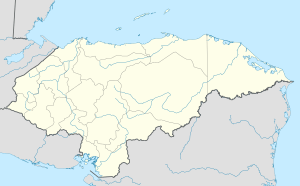Mangulile facts for kids
Quick facts for kids
Mangulile
|
|
|---|---|
|
Municipality
|
|
| Country | |
| Department | Olancho |
| Villages | 16 |
| Area | |
| • Total | 432.65 km2 (167.05 sq mi) |
| Population
(2015)
|
|
| • Total | 9,463 |
| • Density | 21.8722/km2 (56.649/sq mi) |
| Time zone | UTC-6 |
| Climate | Aw |
Mangulile is a municipality (a type of town or district) located in the northwestern part of Olancho, which is a department (like a state or province) in Honduras. It is situated north of Yocón, southwest of Manto, and southeast of Salamá.
Contents
Life and Economy in Mangulile
Life in Mangulile largely depends on farming. Most of the money comes from selling crops like corn, beans, and coffee. People use this money to buy other important foods such as sugar and rice.
Challenges and Improvements
Many small villages in Mangulile are quite remote. This means they often don't have easy access to schools, doctors, or clean drinking water. Most homes get their water from natural springs. However, because Mangulile has a warm, tropical climate, this spring water can quickly become dirty after it reaches the surface.
To help with this, special devices called biosand water filters have been brought to over 25 villages since 2015. These filters have made a big difference in improving people's health by providing cleaner water.
Coffee Farming and Community Support
In 2015, some of the coffee grown in Mangulile was sent to the USA. This happened through a new group called a co-op. A co-op is when farmers work together to sell their products. All the money made from selling this coffee was sent back to Mangulile. This money helps to build and improve things like roads and buildings, and also helps farmers grow even more crops in the future.
Who Lives in Mangulile?
In 2013, a census (a count of people) showed that Mangulile municipality had 9,411 residents. Most of the people, about 97.49%, were Mestizo (people of mixed European and Indigenous ancestry). A smaller number, about 1.94%, were White, 0.43% were Indigenous, and 0.14% were Black or Afro-Honduran.
See also
 In Spanish: Mangulile para niños
In Spanish: Mangulile para niños
 | May Edward Chinn |
 | Rebecca Cole |
 | Alexa Canady |
 | Dorothy Lavinia Brown |


